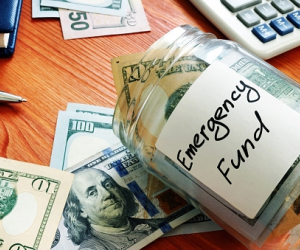Understanding Your Emergency Fund
Now more than ever people are realizing the importance of having an emergency fund. As the pandemic has caused the U.S. economy to go into a recession, people are struggling to make ends meet. An emergency fund is meant to cushion you in the cases where issues like this arise. It can be stressful to properly manage your emergency fund, but it is easier than you think.

What is an Emergency Fund?
This is a set amount of money that is put aside into an account in order to pay for any unexpected events from unemployment, sickness, etc. This fund can help ease your financial stress and allow you to take control over your situation. You do not need to have a large amount of money; these can start small and grow overtime. It is important to remember that these funds are specifically meant for emergencies and they are separate from normal savings and future planning like when you are trying to buy a house, go to college, etc.
How to Know a Good Goal for Your Fund?
While the specific number will vary by based on income, bills, etc. A good rule of thumb is to aim for at least 6 months of bills worth of money for your emergency fund. Getting that money in your emergency fund won’t happen overnight so you need to be able to set goals for yourself every month to set money aside. In order to calculate your emergency fund goal, you you’re your monthly bills by listing out all expenses like car payment, health insurance, groceries, etc. Once you have that number you multiply it by six. So, if you spend $500 a month on bills then your ideal emergency fund will have $3,000 in it. This will prevent you from falling into debt during unexpected situations.
Situations Where You Will Need an Emergency Fund
When you say emergency fund, you may think of job loss or medical emergencies. However, there are many instances where you will need to have an emergency fund. Besides unemployment, and medical emergencies, there are numerous times you may need assistance like child or pet emergencies as well.

What is the difference between an emergency and a non-emergency?
Many people don’t realize the difference between an actual emergency and an unnecessary waste of an emergency fund. Some examples of non-emergency are elective health procedures like cosmetic surgery, vacations, non-necessary home renovations, new appliances like a TV, etc.
How to Store an Emergency Fund?
Emergency funds are best put into a high yield savings account or even a money market account. The reason that this is beneficial is because you almost have instant access to this money in times of need. Another benefit of these account types is the fact that you can gain a small amount of interest rate on the account.
Overall
Emergency funds are an important component of your financial health. You want to be sure that no matter the situation, you are in a secure position to make sure that you don’t fall into debt and hurt your finances.
